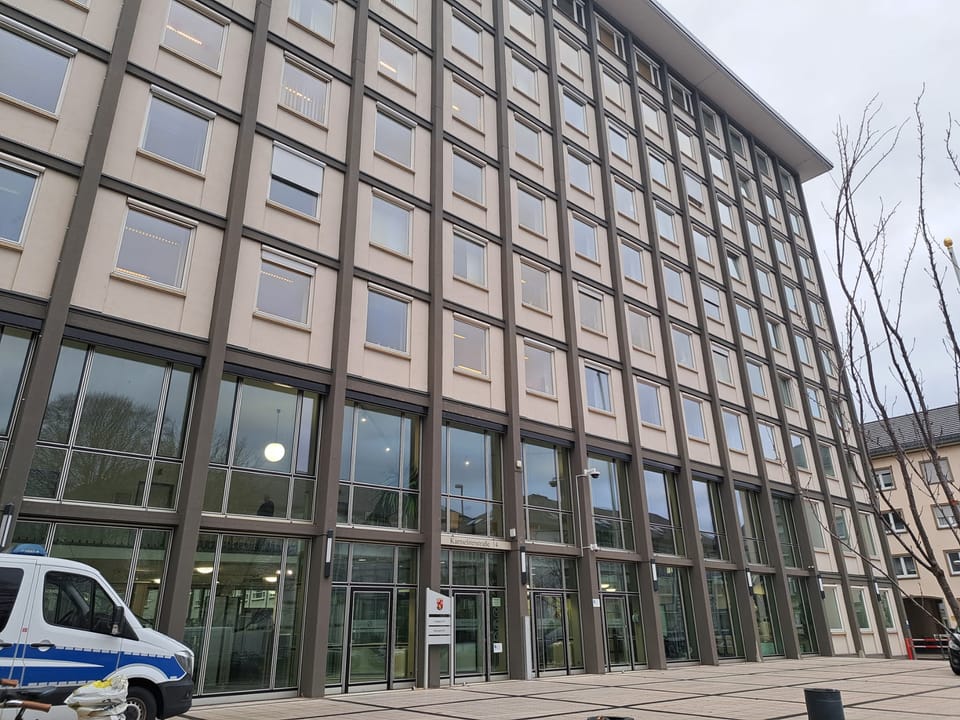
The Opening of the Yarmouk Trial in Koblenz, Germany
On November 19, 2025, the trial of Jihad A., Mahmoud A., Mazhar J., Sameer S., and Wael S. opened before the Higher Regional Court of Koblenz, Germany. The five accused are charged with murder, war crimes, and crimes against humanity for their alleged involvement in the Syrian government’s violent suppression of opposition voices in the Yarmouk District in Damascus between 2012 and 2014, in their capacity as members of the armed militias Free Palestine Movement (FPM) and Popular Front for the Liberation of Palestine – General Command (PFLP-GC).
Notably, a month after the initial indictment, the Federal Public Prosecutor added the additional charge of using civilian starvation as a method of warfare. The trial is of historic significance due to the starvation charge, which has never been charged under the German Code of Crimes Against International Law (GCCAIL). Civilian starvation was a critical dimension of the suffering endured by Palestinian and Syrian civilians during the siege. Considering similar siege operations in Deir Ezzor and Eastern Ghouta in Syria, this trial could set a critical legal precedent in the interpretation of starvation as a prohibited method of warfare that will resonate beyond the present case.
SJAC and the European Center for Constitutional and Human Rights (ECCHR) supported a motion to be filed by leading scholars of international criminal law to audio-record the proceedings for historic and scientific purposes based on Section 169 (2)(1) German Courts Constitution Act (CCA). This section was recently amended to allow recordings of proceedings of legal and political significance beyond Germany alone. As such trials contribute to the body of evidence of war crimes, both a symbolic acknowledgment of the violations that communities suffered and a contribution to future accountability efforts, a recording of this trial would be significant to Syrian and Palestinian communities, and societies affected by conflict more broadly. SJAC signed a letter alongside several Syrian civil society organizations in support of recording the trial. The motion will be filed shortly.
At the opening of the trial, with similar intentions, the defense counsel of one accused filed a motion to record audio and video of the proceedings. He referred to a draft bill on "digital documentation of criminal proceedings" initiated by the previous Federal Government. Although the bill was never adopted, the court should nonetheless record these proceedings based on the spirit of the bill. He also argued that the quality of the proceedings could be improved by providing these recordings to the parties at the end of each hearing week. The defense counsels of the other accused joined the motion.
The prosecutor replied that such a provision existed—namely Section 169 CCA, the basis of the SJAC and ECCHR motion—but that the current case did not meet the standard of historic and scientific significance. She held that the Syrian conflict was already subject to numerous scientific studies, and that those accused did not hold high-ranking positions. The court will respond to the motion on December 3.
Another integral aspect for affected communities to access such proceedings is the availability of interpretation. The audio interpretation already provided to parties to the proceedings could be accessed by non-German speakers with limited additional effort or expense. Access to interpretation secures victims’ rights and ensures that the affected community can follow the trials that impacted their lives.
Following a preliminary injunction by the Federal Constitutional Court in 2020 related to the trial of Eyad A. and Anwar R. before the same court, media-accredited persons with a special relation to Syria received access to interpretation because COVID-19 restrictions precluded the practice of whispered interpretation—when attendees can bring an interpreter to court to provide individual real-time interpretation.
Since the trial in 2020, the respective provision in the German Courts Constitution Act that grants interpretation to non-German speaking parties to the proceedings has specifically been amended to also facilitate access to court interpretation for international media representatives (Section 185 (IV) GVG). This was intended to reduce the organizational and financial burden of bringing a whispered interpreter and to prevent discrepancies in the perception of the proceedings between the parties to the proceedings and those listening.
Because of the nature of universal jurisdiction—addressing the most serious crimes that have occurred in other countries—establishing this practice more widely would pose a great benefit to affected communities. In 2024, SJAC’s Syrian monitors received access to the court’s simultaneous interpretation provided to the accused in the trial of Mohammad A. and Asmael K. in Duesseldorf. Following this best practice, SJAC sought access to interpretation in the Yarmouk case in Koblenz, and after an initial refusal, was granted access to interpretation upon availability of technical equipment. During the first session, SJAC’s monitor received the necessary audio equipment and was able to follow the opening of the trial in Arabic.
Beyond individual trials, SJAC continues to call on courts hearing universal jurisdiction cases to grant requests for interpretation to ensure affected groups’ access to justice processes.
SJAC will do its part to contribute to the historical record of Syria-related trials. SJAC plans to comprehensively monitor the proceedings and publish English and Arabic-language reports on its website to ensure survivors and families have access to these proceedings.
Additionally, another individual—Mahmoud S.—is on trial in Solna, Sweden for his involvement in the war crimes committed in the siege of Yarmouk as an affiliate of armed militias loyal to the Assad government. SJAC is coordinating with the University of Stockholm and the Center for Victims of Torture to monitor proceedings and publish trial reports in English and Arabic since the opening of the trial in Sweden on October 20, 2025.
___________________________
For more information or to provide feedback, please contact SJAC at [email protected] and follow us on Facebook and Twitter. Subscribe to SJAC’s newsletter for updates on our work